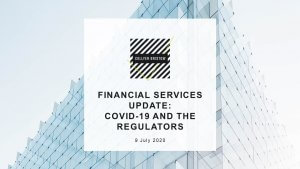- Banking & financial disputes
- Financial services

Longer Reads
Are banks under a duty to prevent Authorised Push Payment fraud?
Chances are that you or someone you know has been the target of Authorised Push Payment fraud. When successful, an accountholder is deceived into thinking they have transferred funds to a legitimate payee (such as a trade supplier), but in actual fact the destination account is controlled by a fraudster. Upon receipt, the funds are scattered to the four winds and the victim generally loses their money for good.
In Philipp v Barclays Bank, the court considered whether a bank’s Quincecare duty extends to preventing Authorised Push Payment fraud.
1 minute read
Published 25 February 2021
Key information
FACTS
In 2018, the claimant (Mrs Philipp) and her husband were tricked into sending £700,000 to bank accounts controlled by fraudsters in the United Arab Emirates. Through an elaborate scheme, the fraudsters convinced Philipps that they were agents of the Financial Conduct Authority and that the payments would assist an ongoing investigation being jointly conducted with the National Crime Agency. The money of course disappeared.
Mrs Philipp sought to hold her bank accountable for the lost £700,000 on the basis that Barclays had breached its Quincecare duty. Barclays applied to strike out the claim.
WHAT IS THE QUINCECARE DUTY?
The so called Quincecare duty, obliges banks to refrain from executing a customer’s instructions if the institution is “on inquiry” (i.e. has reasonable grounds to believe) that the order is an attempt to defraud the customer. Where the bank executes an order in those circumstances, it may be liable to reimburse the customer for their ensuing losses.
COURT DECISION
The claim was novel in that no court had previously been asked to consider whether the Quincecare duty applies in cases of Authorised Push Payment fraud.
Crucially, there were no circumstances to suggest that Barclays was on inquiry about any attempts to defraud Mrs Phillips when she instructed the bank to make the relevant payments. The claimant’s case, therefore, was that Barclays should have had policies and procedures in place detect and prevent Authorised Push Payment fraud (which they did not).
The court was unconvinced by that argument. Mrs Phillips was seeking to extend the scope of the Quincecare duty beyond its established boundaries and the court was not prepared to take that step. It held that the Quincecare duty does not impose upon a bank any professional standards of detective or investigative work. The simple fact was that Barclays at no point had any reasonable grounds to believe that a fraud was being committed on its customer. Therefore no Quincare duty arose and the bank was under no obligation to make inquiries or prevent the relevant payments. The court struck out Mrs Phillips’ claim and ordered summary judgment for Barclays.
COMMENT
Whilst the decision may be a disappointment for bank customers, the judgment does seem to leave the door open to claims that a bank will have been in breach of its Quincecare duty in cases in which the bank had been put on inquiry as to a potential fraud but had then failed to act to protect its customer.
In addition, it should be borne in mind that in 2019 most high street banks signed up to the “Contingent Reimbursement Model Code for Authorised Push Payments scams”. This is a voluntary code under which offers increased protection for consumers who suffer at the hands of Authorised Push Payment fraudsters. Providing that the destination account is in the UK and the customer has not acted negligently, they are usually entitled to be reimbursed if their bank is a signatory to the code.
Link to full judgment: https://www.bailii.org/ew/cases/EWHC/Comm/2021/10.html
Related content
Longer Reads
Are banks under a duty to prevent Authorised Push Payment fraud?
Chances are that you or someone you know has been the target of Authorised Push Payment fraud. When successful, an accountholder is deceived into thinking they have transferred funds to a legitimate payee (such as a trade supplier), but in actual fact the destination account is controlled by a fraudster. Upon receipt, the funds are scattered to the four winds and the victim generally loses their money for good.
In Philipp v Barclays Bank, the court considered whether a bank’s Quincecare duty extends to preventing Authorised Push Payment fraud.
Published 25 February 2021
Associated sectors / services
Authors
FACTS
In 2018, the claimant (Mrs Philipp) and her husband were tricked into sending £700,000 to bank accounts controlled by fraudsters in the United Arab Emirates. Through an elaborate scheme, the fraudsters convinced Philipps that they were agents of the Financial Conduct Authority and that the payments would assist an ongoing investigation being jointly conducted with the National Crime Agency. The money of course disappeared.
Mrs Philipp sought to hold her bank accountable for the lost £700,000 on the basis that Barclays had breached its Quincecare duty. Barclays applied to strike out the claim.
WHAT IS THE QUINCECARE DUTY?
The so called Quincecare duty, obliges banks to refrain from executing a customer’s instructions if the institution is “on inquiry” (i.e. has reasonable grounds to believe) that the order is an attempt to defraud the customer. Where the bank executes an order in those circumstances, it may be liable to reimburse the customer for their ensuing losses.
COURT DECISION
The claim was novel in that no court had previously been asked to consider whether the Quincecare duty applies in cases of Authorised Push Payment fraud.
Crucially, there were no circumstances to suggest that Barclays was on inquiry about any attempts to defraud Mrs Phillips when she instructed the bank to make the relevant payments. The claimant’s case, therefore, was that Barclays should have had policies and procedures in place detect and prevent Authorised Push Payment fraud (which they did not).
The court was unconvinced by that argument. Mrs Phillips was seeking to extend the scope of the Quincecare duty beyond its established boundaries and the court was not prepared to take that step. It held that the Quincecare duty does not impose upon a bank any professional standards of detective or investigative work. The simple fact was that Barclays at no point had any reasonable grounds to believe that a fraud was being committed on its customer. Therefore no Quincare duty arose and the bank was under no obligation to make inquiries or prevent the relevant payments. The court struck out Mrs Phillips’ claim and ordered summary judgment for Barclays.
COMMENT
Whilst the decision may be a disappointment for bank customers, the judgment does seem to leave the door open to claims that a bank will have been in breach of its Quincecare duty in cases in which the bank had been put on inquiry as to a potential fraud but had then failed to act to protect its customer.
In addition, it should be borne in mind that in 2019 most high street banks signed up to the “Contingent Reimbursement Model Code for Authorised Push Payments scams”. This is a voluntary code under which offers increased protection for consumers who suffer at the hands of Authorised Push Payment fraudsters. Providing that the destination account is in the UK and the customer has not acted negligently, they are usually entitled to be reimbursed if their bank is a signatory to the code.
Link to full judgment: https://www.bailii.org/ew/cases/EWHC/Comm/2021/10.html
Associated sectors / services
- Banking & financial disputes
- Financial services
Authors
Need some more information? Make an enquiry below.
Subscribe
Please add your details and your areas of interest below
Article contributors
Jean-Martin
LouwAssociate
Specialising in Commercial disputes, Banking & financial disputes, Commercial arbitration and Financial regulatoryRobin
HenryPartner - Head of Dispute Resolution Services
Specialising in Banking & financial disputes, Commercial disputes, Corporate recovery, restructuring & insolvency, Financial regulatory and Personal insolvency
Enjoy reading our articles? why not subscribe to notifications so you’ll never miss one?
Subscribe to our articlesMessage us on WhatsApp (calling not available)
Please note that Collyer Bristow provides this service during office hours for general information and enquiries only and that no legal or other professional advice will be provided over the WhatsApp platform. Please also note that if you choose to use this platform your personal data is likely to be processed outside the UK and EEA, including in the US. Appropriate legal or other professional opinion should be taken before taking or omitting to take any action in respect of any specific problem. Collyer Bristow LLP accepts no liability for any loss or damage which may arise from reliance on information provided. All information will be deleted immediately upon completion of a conversation.
Close




































































